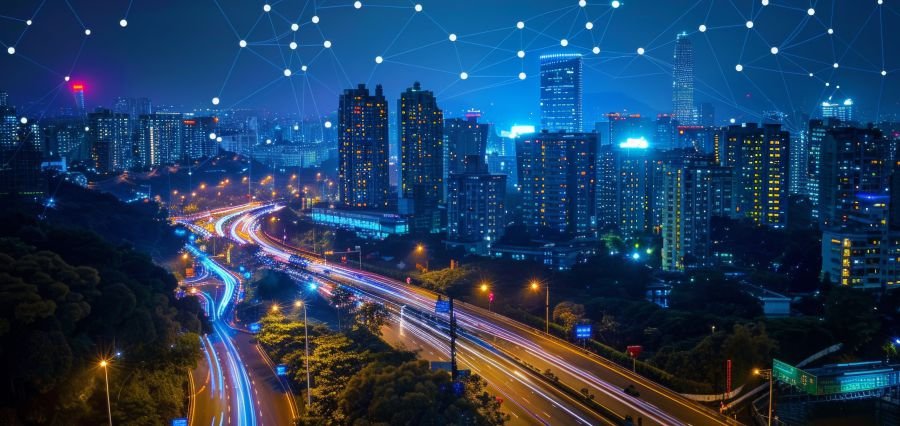Delhi, the bustling capital of India, is undergoing a significant transformation. Fueled by the vision of a smarter, more sustainable future, the city is embracing smart city initiatives that are fundamentally reshaping its urban landscape. These initiatives, with their focus on technology, infrastructure, and citizen well-being, are having a profound impact on the real estate development sector in Delhi.
The Smart City Mission: A Catalyst for Change
In 2015, the Government of India launched the Smart Cities Mission, a nationwide program aimed at developing 100 cities across the country into sustainable and inclusive urban centers. Delhi, being the national capital, was a natural frontrunner in this mission. The city’s smart city proposal focused on key areas like intelligent transportation systems, energy efficiency, waste management, and improved citizen services.
Smart Infrastructure: A Boon for Real Estate
One of the most significant impacts of smart city initiatives on real estate development is the focus on creating smart infrastructure. This includes the development of:
- Intelligent Transportation Systems: Improved public transportation networks, including metros, buses, and electric vehicles, are making commutes shorter and more efficient. This is leading to increased demand for residential and commercial properties in areas with good connectivity.
- Sustainable Energy Solutions: Smart grids and renewable energy sources like solar power are being integrated into the city’s infrastructure. This focus on sustainability is attracting developers and residents who are looking for eco-friendly living and working spaces.
- Digital Connectivity: High-speed internet connectivity and Wi-Fi hotspots are becoming ubiquitous throughout Delhi. This digital infrastructure is essential for modern businesses and is creating a demand for office spaces equipped with the latest technology.
These advancements in infrastructure are making certain areas of Delhi more attractive for real estate development. Developers are now focusing on building projects in areas with good connectivity, sustainable features, and robust digital infrastructure. This is leading to the creation of new business districts, integrated townships, and smart residential complexes.
Transforming Public Spaces: Enhancing Livability
Smart city initiatives are not just about technology and infrastructure. They also place a strong emphasis on creating a better quality of life for citizens. This includes the development of:
- Public Parks and Recreational Areas: The creation of more green spaces, parks, and recreational areas is improving the overall livability of Delhi. This, in turn, is making areas surrounding these spaces more desirable for residential development.
- Smart Waste Management Systems: Efficient waste management systems are not only improving sanitation but also freeing up valuable land for development purposes. This opens up possibilities for creating new residential or commercial projects in previously underutilized areas.
- Improved Citizen Services: Smart city initiatives are leading to the development of e-governance platforms and citizen service centers. This improves the overall efficiency of the city administration and creates a more resident-friendly environment, making Delhi a more attractive place to live and work.
The focus on enhancing public spaces and citizen services is leading to a shift in real estate development priorities. Developers are now looking to create projects that not only offer good living spaces but also provide a sense of community and a good quality of life. This is resulting in the development of mixed-use projects that integrate residential, commercial, and recreational spaces.
Challenges and Considerations
While smart city initiatives offer immense potential for real estate development in Delhi, there are also challenges that need to be addressed. These include:
- Land Availability: Finding land for new development projects within the city limits can be a challenge. This may lead to higher land prices and a focus on densification and redevelopment projects.
- Funding and Investment: Smart city projects require significant investment. Public-private partnerships (PPPs) are crucial for ensuring the successful implementation of these initiatives and attracting private developers to participate in real estate projects.
- Sustainability Concerns: While smart city initiatives promote sustainability, the construction phase of these projects can have an environmental impact. Careful planning and execution are essential to ensure that the development process is environmentally conscious.
The Future of Delhi’s Skyline
The impact of smart city initiatives on Delhi’s real estate development is undeniable. These initiatives are creating a more connected, sustainable, and livable city, which is attracting residents and businesses alike. As these initiatives progress, we can expect to see a significant transformation of Delhi’s skyline. Here are some key trends that are likely to emerge:
- Vertical Cities: With limited land availability, there will likely be a focus on developing high-rise buildings and vertical communities. These buildings will be designed to be energy-efficient and incorporate smart technologies.
- Mixed-Use Developments: The trend of developing mixed-use projects that integrate residential, commercial, and recreational spaces is likely to continue. This creates walkable communities where residents have easy access to all their daily needs.
- Focus on Sustainability: Sustainable building practices and features like rainwater

